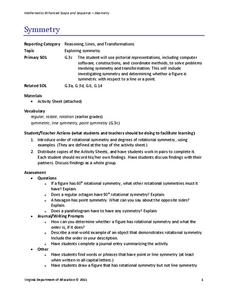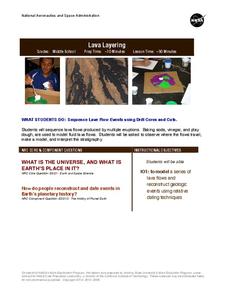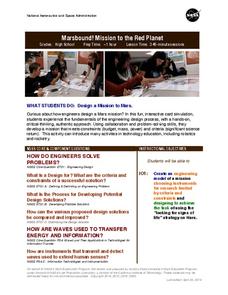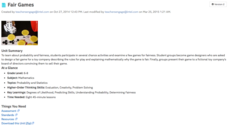Curated OER
Points of View
Cinderella is a classic love story when Cinderella is the protagonist—but what happens if a stepsister tells the story? Focus on point of view with a lesson about fairy tales and story elements. After reading a few familiar fairy tales,...
Virginia Department of Education
Safety and the Material Safety Data Sheet
While many chemicals are used in biology class, many pupils don't understand the material safety data sheets. The lesson explains each part and the importance of understanding the forms. Young scientists use safety equipment to ensure...
Do2Learn
Taking Turns
Whose turn is it? Keep track of individuals' turns with a turn-taking board. Applicable to every subject and classroom, the educational strategy provides pupils with structured expectations and endurance while awaiting their turn.
02 x 02 Worksheets
Symmetry
Get learners' minds rotating and reflecting while looking for symmetry. Pupils investigate figures to determine the number of lines of symmetry and if the figure has rotational symmetry. Classmates work together in groups to find out the...
Serendip
From Gene to Protein via Transcription and Translation
DNA carries the codes for creating just the right protein. A well-designed lesson leads pupils through the process from start to finish and everywhere in between. Guiding questions with supporting video help scholars understand the...
Curated OER
Human Cloning: Is it Biological Plagiarism?
Is cloning good or harmful? Help your class understand the risks and benefits as they read, research, and discuss human cloning. Individuals form teams, research information, and present to the class before concluding with an in-depth...
August House
The Magic Pot
The Magic Pot by Patricia Coombs is the theme of this multidisciplinary lesson plan. Early readers first take part in a read aloud and grand conversation about the story's details. Then, they get to work practicing their skills in...
RSA Group
Write About This
Looking for an easy way to encourage youngsters to write about a variety of different topics? Users simply choose an image to write about from a large selection of beautiful photographs and then compose original opinion pieces and...
Curated OER
Patterns in the Multiplication Table
Explore patterns in the multiplication table in order to deepen your third graders' understanding of this essential skill. Implement this activity as a whole-class lesson, allowing students to work in pairs or small groups to support...
Curated OER
Spanish Commands (the Imperative Mood)
It is imperative that your pupils have a strong command of all the Spanish moods, including the one that is the focus of this resource. Learners can read up on formal, informal, affirmative, and negative commands as well as how to use...
NASA
Lava Layering
Take the old baking soda and vinegar volcano to the next level by using it to study repeated lava flows over time, examine geologic features on Earth and Mars, and speculate about some of the formations on Mars.
Achieve3000
Discriminating Phonemes 2
Some sounds sound very similar! Help your class learn how to distinguish between various sounds by following the steps outlined in this plan. The plan includes a warm-up, a teacher-led portion, and details for guided and independent...
Collaborative Learning Project
Four in a Row Addition and Subtraction
Scroll down to find four fun addition and subtraction partner game boards, complete with endless opportunities for practice with numbers 0-38. Kids choose numbers from a number box and, depending on the game, either find the sum or the...
New York City Department of Education
Geography and Early Peoples of the Western Hemisphere
Young historians discover the early people of the western hemisphere. The unit explores how the land changed, how it was used and homes of early Americans such as Incas, Mayans, Inuits, Aztecs, and Pueblos. Individuals also examine these...
New York City Department of Education
Colonial America and The American Revolution
How did the founding of the American colonies lead to a revolution? Use the essential question and sample activities to guide learners through a series of history lessons. Additionally, the packet includes effective strategies to...
Olomana School
Mixtures and Solutions: Paper Chromatography Experiment
Why does some ink bleed through paper, and other ink doesn't? Practice some paper chromatography to separate the colors from a pen with an interactive experiment for middle and high schoolers. Learners use a variety of solutions to track...
Curated OER
Sphere Dressing
Geometric design makes a fashion statement! Challenge learners to design a hat to fit a Styrofoam model. Specifications are clear and pupils use concepts related to three-dimensional objects including volume of irregular shapes and...
Knox Education
Opinion Argument Writing Packet
You won't need much persuading to use an argumentative writing packet in your language arts class! With helpful reference pages, guided practice through the writing process, examples of opinion and argument writing, and a thorough...
NASA
Marsbound! Mission to the Red Planet
It's time to go to Mars. Using the provided cards and mat, groups design a mission to Mars. The cards contain information about the different components of the launch and warn about a few mishaps that might occur along the way.
EngageNY
Finding Systems of Inequalities That Describe Triangular and Rectangular Regions
How do you build a polygon from an inequality? An engaging lesson challenges pupils to do just that. Building from the previous lesson in this series, learners write systems of inequalities to model rectangles, triangles, and even...
EngageNY
The Graph of the Natural Logarithm Function
If two is company and three's a crowd, then what's e? Scholars observe how changes in the base affect the graph of a logarithmic function. They then graph the natural logarithm function and learn that all logarithmic functions can be...
Mathematics Vision Project
Module 5: Modeling with Geometry
Solids come in many shapes and sizes. Using geometry, scholars create two-dimensional cross-sections of various three-dimensional objects. They develop the lesson further by finding the volume of solids. The module then shifts to finding...
National Security Agency
Multiple Representations of Limits
After an introductory activity to demonstrate the theory of a limit, additional activities approach a limit from graphical, numerical, and algebraic methods. The activity looks at the multiple ways of understanding and evaluating a limit.
Intel
Fair Games
Who said things were fair? The unit introduces probability and its connection to fairness. The class interacts with activities of chance and plays games to relate them to fairness. Groups design a fair game and develop a presentation....

























